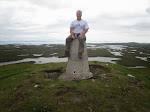Mamora’s Warbler – St Abb’s Head National Nature Reserve, St Abb’s, Scottish Borders, 23rd May 1993
Sketch based on a photograph taken by Dave Came at the same time I was watching the bird alongside him, attempting to capture how the Marmora's Warbler looked when feeding on the ground on the edge of an area of cleared gorse scrub.
So it was that on Sunday the 23rd May I was returning from my epic twitch to Norfolk, having stayed (and recuperated!) overnight at my fathers in Chesterfield.
I called into the services on the A1 at Washington in Tyne and Wear for fuel and checked my pager to find the rather splendid news of a Marmora’s Warbler at St. Abb’s Head, virtually en route home. This was a real bonus as I had missed the two-day bird at Spurn just under a year earlier. It was 16:45. After an exhilarating A1(T) drive (is there such a thing?) I was at St. Abb’s Head, as remembered from the previous year.A very few birders could be seen on the slope working the gorse above Mire Loch. I managed to find the last parking space and quickly made my way across the slope towards them. There were two familiar faces (the storm-troopers seen at the Dusky Warbler) at least. I was gestured at in a way which meant ‘it’ was between me and them. Good!
Scrubby gorse bushes were all that was between me and them, some ten or twelve birders.
And then suddenly there it was, on the edge of the nearest bush. I had brief but good binocular views before it flew past me to some sycamores at the base of the slope. Again, I located it, and this time I got even better views from the slope, well, at least before it disappeared into a massive area of gorse bushes. I was resigned at this point to that being the last I might be seeing of it. But no, as I surmised, it returned to the sycamores to provide more brief views, before making its way back to the scrubby scattered gorse. Here it disappeared, or apparently so, but once it moved from one to the next, we moved from being on the slope to the base of it. This was an inspired move as looking up into the skeletal gorse rather than down onto the broken crowns of the gorse clumps. This afforded amazing views as this amazing plus worked the gorse litter – in the ‘scope at less than 30m. Fantastic!!!!
It was an obvious sylvia warbler, very similar to Dartford Warbler in terms of size, shape and appearance, although possibly had an even longer tail. Its plumage was grey overall, with a darker head. Its bill and legs were orangy-yellow and its eye was red.
After 1.5 hours I left the site, only three hours after I had first become aware of the news whilst I was at Washington Services. Vindication for me having my new pager? I think so!!!!



No comments:
Post a Comment